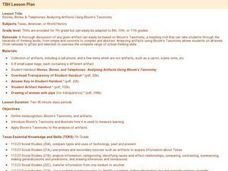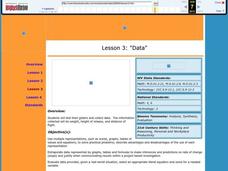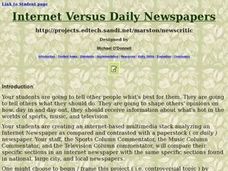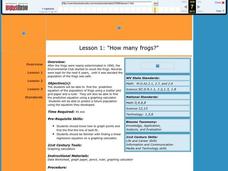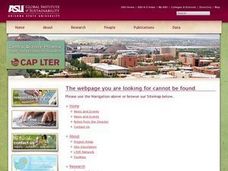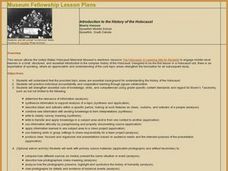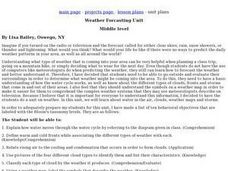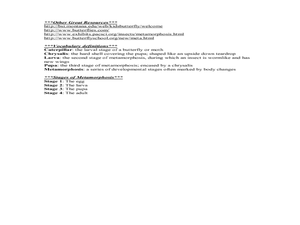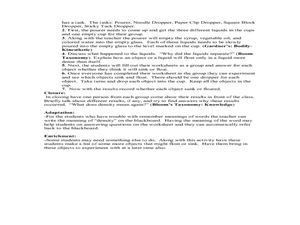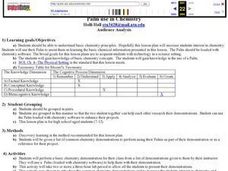Curated OER
Stones, Bones & Telephones: Analyzing Artifacts Using Bloom's Taxonomy
Seventh graders define metacognition, Bloom's Taxonomy, and artifacts. They, in groups, try to identify a mystery artifact using the Artifact Analysis sheet. They present their findings to the class.
Curated OER
Classroom Questioning
Students use this lesson to focus on classroom questioning and Bloom's taxonomy. Using the internet, they use the Bloom's taxonomy website to examine their framework on questions. They use this information to develop their experiments.
Curated OER
Data
Students collect data from an experiment they perform. In this data lesson plan, students use multiple representations to solve practical problems; describe advantages and disadvantages of the use of each representation. Then, they...
Curated OER
Magnets and Interactions
Second graders discover what magnets can do. In this magnet lesson students make predictions about magnets. They experiment with the magnets and record their data on a chart.
Curated OER
Camping Near the Estuary
Students examine the first meeting between the first Spanish settlers and the native groups of the Tijuana estuary. Using a map, they trace various expeditions throughout Goat Canyon and the Spanish migration. After reading text, they...
Curated OER
Internet Versus Daily Newspapers
Seventh graders address a series of questions based on Bloom's Taxonomy. Students find a position to be formulated and defended, specifically the Internet newspaper or the traditional daily newspaper. Students create a five card...
Curated OER
Antibiotic Resistance
Students using the scientific method, study bacteria as a covering surface of the earth in many forms. They discover that not all bacteria is bad and introduce the topic of antibiotic resistance. Science Fair expectations are addressed.
Curated OER
When is Dinner Served? Predicting the Spring Phytoplankton Bloom in the Gulf of Maine (College Level)
Students are able to explain the ecological importance of phytoplankton. They describe the components that influence a phytoplankton bloom. Students interpret satellite images in order to correlate buoy data.
Curated OER
Human Body Corp.
Learners investigate body systems by participating in a role-play activity. Third, fourth, and fifth graders pretend that they are an organ or system of the human body, and they must write a letter to the body "corporation" discussing...
Curated OER
How Many Frogs?
Students explore the concept of linear regression. In this linear regression lesson, students find the line of best fit for a set of data pertaining to a frog population. Students use their line of best fit to predict the frog population...
Curated OER
Gallery Walk Questions on Earth's Radiation Balance
Questions that can be used in a lesson on Earth's radiation balance are suggested in this resource. It is not a lesson plan, per se, but it is a list of questions for stations within a "Gallery Walk" lesson. The link to how Gallery Walks...
Curated OER
Exploration of 'pill bugs'
Fifth graders define words. They create a dichotomous key. After carefully examining pill bugs, 5th graders record observations. They compare and contrast habitats of pillbugs.
Curated OER
Exploration of "Pillbugs"
Fifth graders define vocabulary terms, identify the characteristics of a pillbug, and create a dichotomous key. Then they examine the pillbugs and make observations and record these observations. Finally, 5th graders observe specific...
Curated OER
Introduction to the History of the Holocaust
The Holocaust is unbelievable! Examine this piece of history with your class. Using the Internet, research groups determine the relevance of information presented, compare how different sites present the same information, synthesize...
Curated OER
Do We Need to Wear a Rainhat? Acid Rain: Causes, Effects, and Possible Solutions
Acid rain, and how it affects the environment, is the focus of this Earth science lesson. During the study, learners evaluate measures to reduce acid rain, and design an investigation to demonstrate the conection between a hypothesis and...
Curated OER
Making Big Cats' Web Pages
Students investigate the lives of big cats by creating a website. In this web design lesson plan, students examine web authoring software in pairs as they read books on big cats. Students share their web page creations with the class...
Curated OER
Probability Activity
Learners differentiate between theoretical and experimental probability. In this probability activity, students create a puzzle and calculate the probability of an event occurring. They use problems dealing real life scenarios.
Curated OER
Weather Forecasting Unit
Young scholars study weather concepts, mapping, characteristics in this series of lessons.
Curated OER
Life Cycle of the Monarch Butterfly
Third graders access prior knowledge of the monarch butterfly and discuss what they would like to know. In this Monarch Butterfly lesson,students read Monarch Butterfly and discuss the life cycle of the butterfly. Students gather...
Curated OER
Liquids: Floating and Sinking
Third graders conduct an experiment. In this floating and sinking liquids instructional activity, 3rd graders discuss density and investigate it using syrup, vegetable oil and colored water. Students observe the results and complete a...
Curated OER
Ruler and Magnifying Fun
First graders investigate objects using rulers and magnifying glasses. They record their observations using a data-recording sheet and write a characteristic for each item they observe. They use the ruler to solve math problems.
Curated OER
Palm use in Chemistry
Students use a Palm loaded with chemistry software to assist them in gaining information presented in a lesson about basic chemistry principles. They perform a basic chemistry demonstration for their class using information from received...
Curated OER
Water: Liquid or Solid?
First graders investigate how water can be both a liquid and a solid. They weigh popsicles and observe them as they write in their science journals. They measure the liquid as the popsicle melts and refreeze them to change them back...
Curated OER
Properties of Color
Second graders explore the properties of primary color and investigate what happens when primary colors are mixed. They listen to the story The Crayon Box That Talked and list the colors. They experiment mixing primary colors and...


